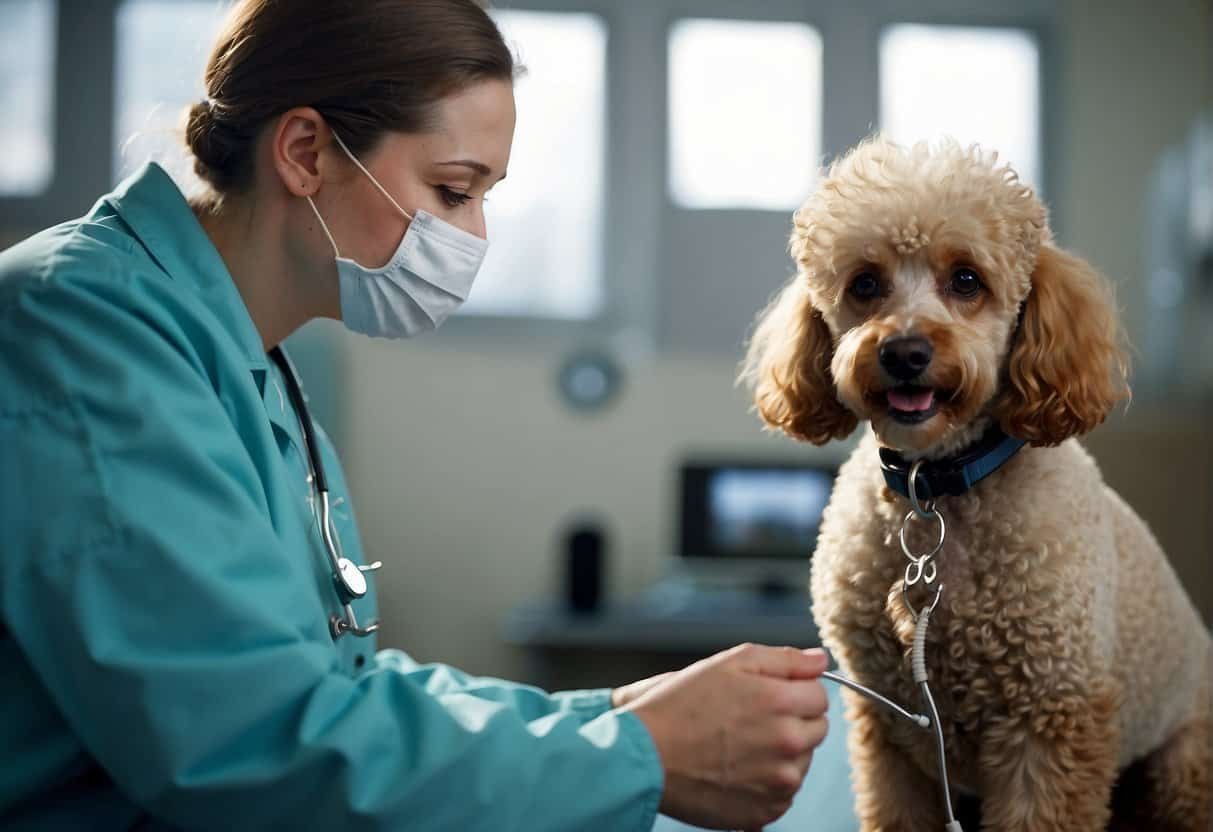Poodles are a beloved breed of dog known for their intelligence, elegance, and playful personalities. However, like all dogs, they are susceptible to certain health issues that can affect their quality of life. It is important for poodle owners to be aware of these common health issues and take steps to prevent them from occurring.
In This Article
Use the headings below to navigate to topics that interest you most.
Understanding the unique characteristics of poodles can help owners identify potential health problems early on. Poodles are a breed that is prone to certain genetic conditions, such as hip dysplasia, hypothyroidism, and Addison’s disease. They are also at risk for developing other health issues such as bloat, epilepsy, and hypoglycemia. Recognizing the signs and symptoms of these conditions is crucial for early diagnosis and treatment.
In this article, we will explore the most common health issues in poodles, their signs and symptoms, diagnosis and treatment options, and most importantly, how to prevent them from occurring in the first place. By being proactive in your poodle’s health care, you can help ensure that they live a long, happy, and healthy life.
Key Takeaways
- Poodles are a breed that is prone to certain genetic conditions and other health issues.
- Recognizing the signs and symptoms of these conditions is crucial for early diagnosis and treatment.
- Being proactive in your poodle’s health care can help prevent common health issues from occurring.
From Our Experience: As poodle enthusiasts who have worked with hundreds of poodle owners and rescue organizations over the years, we’ve gathered real-world insights that go beyond textbook knowledge. The information in this article reflects both professional expertise and hands-on experience with poodles of all sizes and temperaments.
Understanding Poodles
Poodles are a highly intelligent breed of dog known for their curly, hypoallergenic coat. They come in three sizes: standard, miniature, and toy. Poodles are active and energetic dogs that require regular exercise and mental stimulation to stay healthy and happy.
One of the most important factors in preventing health issues in poodles is choosing a reputable breeder. A reputable breeder will conduct health testing on their breeding dogs to ensure that they are not passing on any genetic health issues to their offspring. They will also provide proper socialization and care for their puppies before they go to their new homes.
Poodles are highly intelligent dogs and require mental stimulation to prevent boredom and destructive behavior. They excel in obedience and agility training and enjoy learning new tricks. Providing your poodle with regular training and mental stimulation can help prevent behavioral issues and promote a strong bond between you and your dog.
It is important to note that poodles, like all dogs, are susceptible to certain health issues. Some of the most common health issues in poodles include hip dysplasia, bloat, and hypothyroidism. Regular veterinary check-ups and preventative care can help catch these issues early and prevent them from becoming more serious.
In the following sections, we will discuss some of the most common health issues in poodles and provide tips on how to prevent them.
Common Health Issues in Poodles
As with all breeds, Poodles are susceptible to a variety of health issues. It is important for owners to be aware of these common health problems and take steps to prevent them. In this section, we will discuss some of the most common health issues in Poodles and provide information on how to prevent them.
Hip Dysplasia
Hip dysplasia is a common condition in which the hip joint does not develop properly. This can lead to arthritis and lameness. Poodles, especially Standard Poodles, are at increased risk for hip dysplasia. To prevent hip dysplasia, it is important to only purchase Poodles from reputable breeders who have screened their dogs for hip dysplasia.
Bloat
Bloat, also known as gastric torsion or twisted stomach, is a life-threatening condition that can occur in Poodles. Bloat is caused by the stomach filling with gas and twisting on itself. This can cut off blood flow to the stomach and other organs. To prevent bloat, it is important to feed Poodles small, frequent meals and avoid exercise for at least an hour after eating.
Epilepsy
Epilepsy is a neurological disorder that can cause seizures in Poodles. While the exact cause of epilepsy is unknown, it is believed to be genetic. To prevent epilepsy, it is important to only purchase Poodles from breeders who have screened their dogs for epilepsy.
Hypothyroidism
Hypothyroidism is a condition in which the thyroid gland does not produce enough thyroid hormone. This can cause a variety of symptoms, including weight gain, lethargy, and skin problems. To prevent hypothyroidism, it is important to feed Poodles a balanced diet and provide regular exercise.
Addison’s Disease
Addison’s disease, also known as hypoadrenocorticism, is a condition in which the adrenal glands do not produce enough hormones. This can cause a variety of symptoms, including weakness, vomiting, and diarrhea. To prevent Addison’s disease, it is important to provide regular veterinary care and monitor Poodles for any changes in behavior or appetite.
Progressive Retinal Atrophy
Progressive retinal atrophy is a genetic condition that can cause blindness in Poodles. To prevent progressive retinal atrophy, it is important to only purchase Poodles from breeders who have screened their dogs for this condition.
Luxating Patella
Luxating patella is a condition in which the kneecap dislocates from its normal position. This can cause lameness and arthritis. To prevent luxating patella, it is important to only purchase Poodles from breeders who have screened their dogs for this condition.
Seizures
Seizures can be caused by a variety of factors, including epilepsy, brain tumors, and liver disease. To prevent seizures, it is important to provide regular veterinary care and monitor Poodles for any changes in behavior or appetite.
Arthritis
Arthritis is a common condition in which the joints become inflamed and painful. This can be caused by a variety of factors, including hip dysplasia and luxating patella. To prevent arthritis, it is important to provide regular veterinary care and monitor Poodles for any signs of joint pain or stiffness.
Hypoglycemia
Hypoglycemia, or low blood sugar, is a common condition in Poodle puppies. This can cause weakness, lethargy, and seizures. To prevent hypoglycemia, it is important to feed Poodle puppies small, frequent meals and monitor them for any signs of weakness or lethargy.
Heart Disease
Heart disease is a common condition in Poodles, especially Miniature and Toy Poodles. This can cause a variety of symptoms, including coughing, lethargy, and difficulty breathing. To prevent heart disease, it is important to provide regular veterinary care and monitor Poodles for any changes in behavior or appetite.
Sebaceous Adenitis
Sebaceous adenitis is a skin condition that can cause hair loss and skin lesions in Poodles. To prevent sebaceous adenitis, it is important to provide regular grooming and skin care for Poodles.
In conclusion, while Poodles are generally healthy dogs, they are susceptible to a variety of health issues. By providing regular veterinary care, feeding a balanced diet, and monitoring for any changes in behavior or appetite, owners can help prevent these common health problems.
Signs and Symptoms
It is important to be aware of the signs and symptoms of common health issues in poodles to ensure early detection and treatment. Here are some of the most common signs and symptoms to watch out for:
Lethargy and Weakness
Lethargy and weakness are common symptoms of many health issues in poodles. If your poodle is not as active as usual or seems to be struggling to move around, it may be a sign that something is wrong. These symptoms can be caused by a range of health issues, including hypothyroidism, Addison’s disease, and heart problems.
Vomiting and Diarrhea
Vomiting and diarrhea can be a sign of many different health issues in poodles, including food allergies, infections, and gastrointestinal issues. It is important to monitor your poodle’s bowel movements and watch for any changes in frequency, consistency, or color.
Weight Loss or Gain
Sudden weight loss or gain can be a sign of an underlying health issue in poodles. If your poodle is losing weight without any changes to their diet or exercise routine, it may be a sign of an underlying health issue. Conversely, if your poodle is gaining weight rapidly, it could be a sign of a thyroid problem or other health issue.
Limping and Pain
Limping and pain can be a sign of joint problems, injuries, or other health issues in poodles. If your poodle is limping or seems to be in pain, it is important to take them to the vet for a check-up.
Excessive Drooling and Panting
Excessive drooling and panting can be a sign of stress, anxiety, or overheating in poodles. However, if your poodle is drooling or panting excessively without any obvious cause, it could be a sign of an underlying health issue.
Loss of Appetite
Loss of appetite can be a sign of many different health issues in poodles, including dental problems, gastrointestinal issues, and infections. If your poodle is not eating or seems to have lost their appetite, it is important to take them to the vet for a check-up.
Coughing and Breathing Problems
Coughing and breathing problems can be a sign of respiratory issues, heart problems, or other health issues in poodles. If your poodle is coughing or seems to be having trouble breathing, it is important to take them to the vet for a check-up.
Blindness and Itching
Blindness and itching can be a sign of eye problems, allergies, or other health issues in poodles. If your poodle is scratching excessively or seems to be having trouble seeing, it is important to take them to the vet for a check-up.
Distended Stomach and Painful Abdomen
A distended stomach and painful abdomen can be a sign of bloat, a life-threatening condition that requires immediate veterinary attention. If your poodle’s stomach is bloated or they seem to be in pain, it is important to take them to the vet right away.
Pacing and Depression
Pacing and depression can be a sign of stress, anxiety, or other health issues in poodles. If your poodle is pacing or seems to be depressed, it is important to take them to the vet for a check-up.
Dehydration and Increased Thirst
Dehydration and increased thirst can be a sign of many different health issues in poodles, including kidney problems, diabetes, and heat stroke. If your poodle is drinking more water than usual or seems to be dehydrated, it is important to take them to the vet for a check-up.
By being aware of these signs and symptoms, you can help ensure that your poodle stays healthy and happy. If you notice any of these symptoms in your poodle, it is important to take them to the vet for a check-up as soon as possible.
Diagnosis and Treatment
When it comes to poodle health issues, early diagnosis and prompt treatment can make all the difference. A veterinarian is the best resource for diagnosing and treating any health issues that your poodle may have. In this section, we will discuss the diagnosis and treatment of common health issues in poodles.
Diagnosis
Diagnosing a health issue in your poodle can be done in several ways. The first step in the process is a physical exam by a veterinarian. During the exam, the vet will look for any signs of health issues, including abnormal growths, lumps, or bumps. They may also check your poodle’s heart rate, breathing, and temperature.
In some cases, genetic testing may be necessary to diagnose certain health issues that are common in poodles. For example, testing for progressive retinal atrophy (PRA) can help identify the disease before symptoms appear. Additionally, pet insurance can help cover the cost of genetic testing and other diagnostic tests.
Treatment
Once a health issue has been diagnosed, treatment can begin. The treatment options available will depend on the specific health issue and its severity. Surgery may be necessary in some cases, such as when a poodle has hip dysplasia or luxating patella. Medications may also be prescribed to manage symptoms or treat the underlying condition.
It is important to follow your veterinarian’s instructions carefully when treating your poodle’s health issues. This may include administering medications at specific times or in specific amounts. Regular check-ups with your vet can also help ensure that your poodle’s treatment plan is working effectively.
In conclusion, early diagnosis and prompt treatment are crucial for managing common health issues in poodles. By working closely with your veterinarian, you can help ensure that your poodle stays healthy and happy for years to come.
Prevention and Care
Preventing health issues in poodles is essential to ensure their quality of life. Regular exercise and a healthy diet are crucial for maintaining their overall well-being. Poodles are active dogs that require daily exercise to keep them physically and mentally stimulated. A lack of exercise can lead to obesity, which can increase the risk of several health issues.
A healthy diet is also important for poodles. Feeding them a balanced diet that is rich in nutrients can help prevent several health issues such as hypoglycemia and thyroid issues. Supplements can also be added to their diet to ensure that they are getting all the necessary vitamins and minerals.
Maintaining healthy blood sugar levels is crucial for poodles. Hypoglycemia is a common health issue in poodle puppies, and it can be prevented by feeding them small, frequent meals throughout the day. Bacteria can also cause several health issues in poodles, so it is important to keep their environment clean and to ensure that they have access to clean water at all times.
The adrenal glands and thyroid gland play a crucial role in a poodle’s health. The adrenal glands produce hormones such as aldosterone, which regulates fluid and electrolyte balance in the body. The thyroid gland produces hormones that regulate the body’s heart rate, temperature, and metabolism. Regular check-ups with a veterinarian can help detect any issues with these glands early on and prevent them from developing into more serious health issues.
Urination is another important aspect of a poodle’s health. It is important to monitor their urination habits and ensure that they are urinating regularly. If a poodle is not urinating regularly, it can be a sign of a urinary tract infection or other health issues.
In summary, preventing health issues in poodles requires regular exercise, a healthy diet, and monitoring their blood sugar levels, bacteria exposure, adrenal glands, thyroid gland, and urination habits. Regular check-ups with a veterinarian can also help detect any issues early on and prevent them from developing into more serious health issues. By following these preventative measures, poodle owners can ensure that their furry friends live a happy and healthy life.
Frequently Asked Questions
As a Poodle owner, it’s important to be aware of the most common health issues that Poodles face and how to prevent them. Here are some frequently asked questions about Poodle health:
What are the most common health issues that Poodles face?
Poodles are prone to several health issues, including hypothyroidism, bloat, Addison’s Disease, hip dysplasia, epilepsy, hypoglycemia, mitral valve disease, hyperthyroidism, and entropion. It’s important to work closely with your veterinarian to prevent and manage these conditions.
How can I prevent joint problems in my Poodle?
Joint problems are common in Poodles, particularly hip dysplasia. To prevent joint issues, it’s important to keep your Poodle at a healthy weight, provide regular exercise, and feed a high-quality diet. Additionally, you can work with your veterinarian to develop a supplement regimen that supports joint health.
What are the symptoms of hip dysplasia in Poodles?
Hip dysplasia is a common joint issue in Poodles. Symptoms include limping, reluctance to move, stiffness, and difficulty getting up or lying down. If you suspect your Poodle has hip dysplasia, it’s important to bring them to the veterinarian for an evaluation.
What is Addison’s disease and how can I recognize it in my Poodle?
Addison’s disease is a hormonal disorder that affects Poodles. Symptoms include vomiting, diarrhea, lethargy, loss of appetite, and weight loss. If you suspect your Poodle has Addison’s disease, it’s important to bring them to the veterinarian for an evaluation.
What are some common behavior problems in Poodles and how can I address them?
Poodles are intelligent dogs, but they can also be prone to behavior problems such as separation anxiety, aggression, and excessive barking. To address these issues, it’s important to provide plenty of mental and physical stimulation, establish a consistent routine, and work with a professional trainer as needed.
What is the average life expectancy of a Poodle?
The average life expectancy of a Poodle is around 12-15 years. However, this can vary depending on factors such as genetics, diet, exercise, and overall health. To ensure your Poodle lives a long and healthy life, it’s important to work closely with your veterinarian and provide proper care and attention.
Ready to Adopt a Poodle?
Find poodle rescues and adoption organizations near you. Give a loving poodle their forever home.







